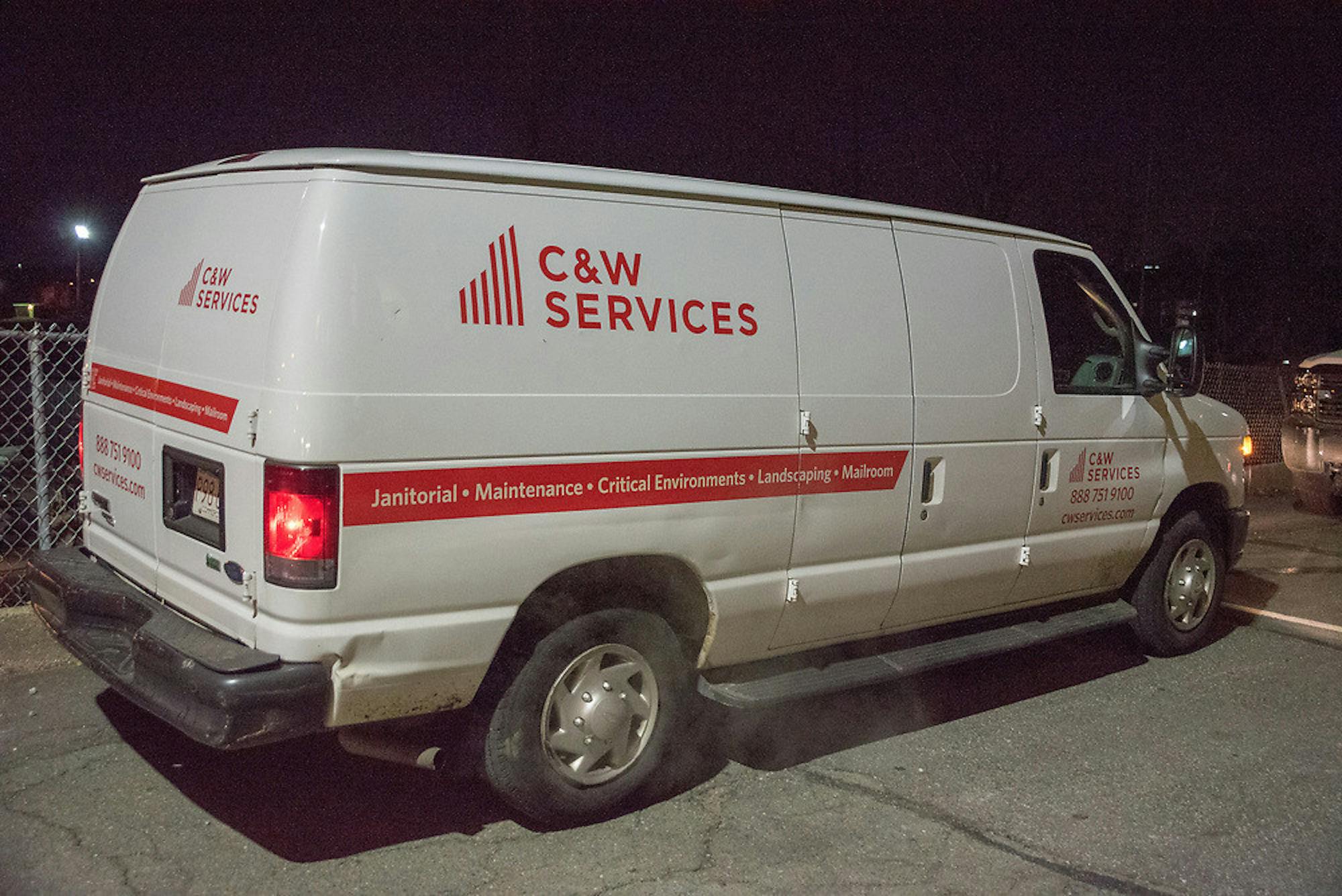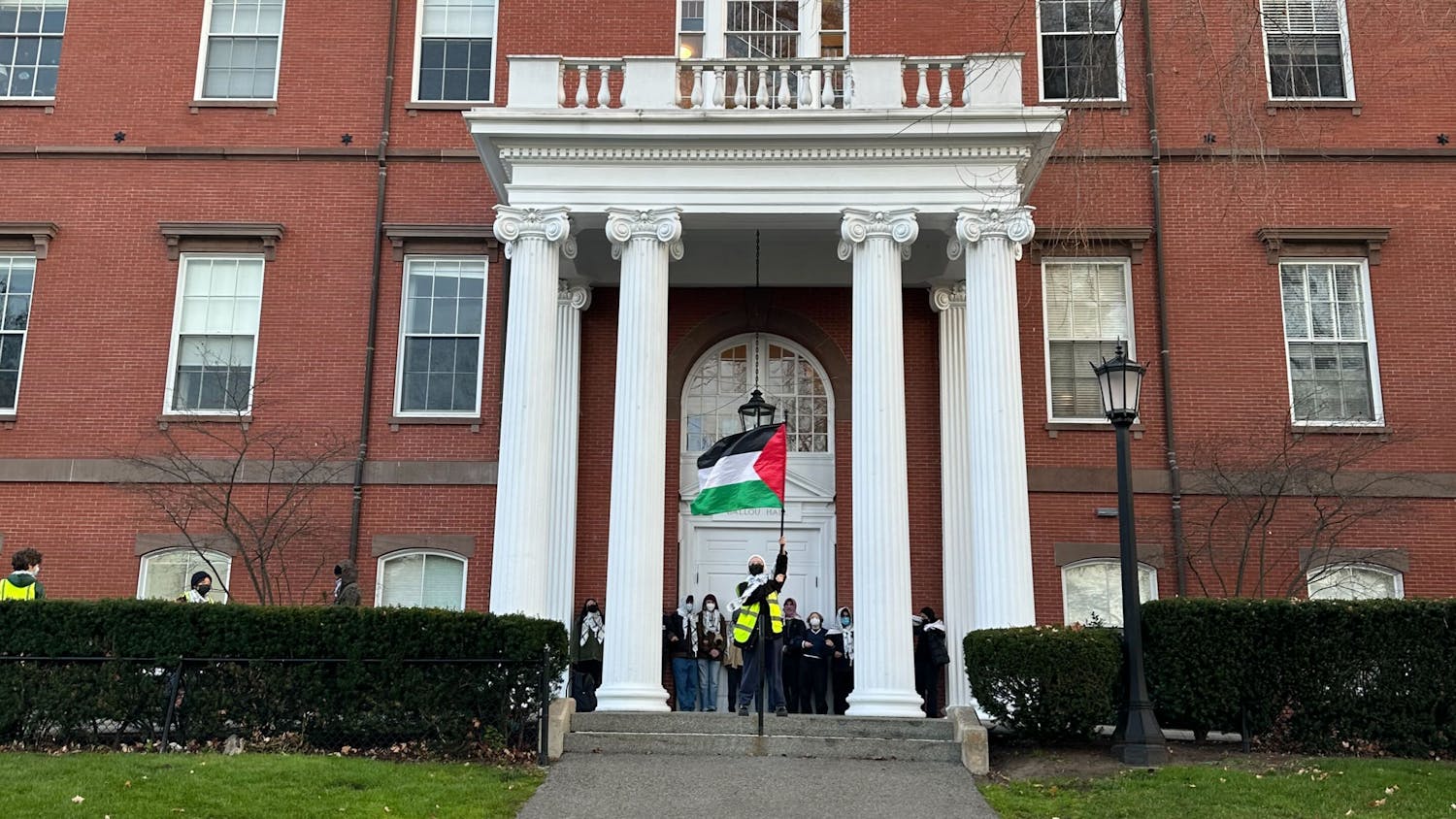Content warning: This article discusses mental health.
Editor’s note: This article contains the alleged use of the N-word by a C&W Services employee. In addition, quotes from several janitors were translated from Spanish to English by the reporters of this article.
When Victoria Guerra started her new job as a janitorial supervisor at Tufts University in February 2017, she was looking for something more convenient and closer to her home and kids. Instead, she experienced one of the most trying years of her life, culminating in her firing in September by C&W Services, the company with which Tufts contracts its custodial labor.
The problem started when Guerra objected to her supervisor, C&W Services Account Manager Shawn Amaral, making comments toward other employees that she perceived as racist. After Guerra reported Amaral’s racist comments to C&W Services Human Resources (HR), he made her job especially difficult by undermining her authority in front of other janitors and framing her for mistakes she did not make, among other issues. Eventually, Guerra received a four-day suspension in August and was fired one month later for insubordination and unauthorized recording of her interactions with Amaral.
Guerra told the Daily in an interview that she felt depressed and had been visiting a psychologist because of the hostile work environment created by her superiors and C&W Services HR.
“It was like I was nothing to [C&W Services],” Guerra said.
Amaral did not reply to multiple requests for comment.
Guerra’s story is emblematic of a workplace environment that over half a dozen janitors at Tufts have described as hostile. Tufts janitors approved a contract with C&W Services in November 2016, but the contract has not prevented a further deterioration in working conditions. An April 2017 petition signed by almost 100 janitors on the Medford/Somerville campus leveled five demands at Tufts and C&W Services to improve custodial working conditions. Former janitor Anita Posadas said in November 2017 that she did not receive adequate compensation from C&W Services for her workplace injury partially arising from a heavy workload.
Patrick Collins, Tufts’ executive director of public relations, said that the university is not involved in these matters.
“We appreciate the work of C&W custodians and their contributions to the maintenance of the spaces we work and learn in. Issues related to the C&W workplace environment are properly addressed by the custodians’ employer, C&W, and the custodians’ union,” Collins told the Daily in an email.
Tufts will decide whether to continue working with C&W Services when the university’s contract with the company expires in August 2019, according to Collins.
C&W Services spokesperson Christine Wickes said the company does not comment on specific personnel matters.
“We strive to ensure C&W Services is a fair, safe, and equitable workplace for every employee,” Wickes told the Daily in an email. “We can’t comment on specific personnel matters, but we investigate every employee’s concerns fully. The outcomes of our investigations are confidential for the protection of all employees involved.”
Guerra was working for C&W Services at another location from 2014–2017. She described the working conditions as good, her bosses as respectful and expected the same when she moved to Tufts. Things were good for the first few months.
Guerra said things changed when Amaral made a comment about four months after she moved to Tufts about how a black employee could not clean a certain area. She was surprised by the answer she received.
“It was a shock when [Amaral] told me, ‘Oh because maybe she’s a negra lazy,’” Guerra said.
Guerra added that Amaral claimed to be repeating the racial epithet “negra lazy” that he heard Tufts’ Director of Campus Services Gary Hill use previously. Amaral did not respond to multiple requests for comment.
Hill, whose responsibility includes managing Tufts’ contract with C&W Services, said he has never said those words or anything similar and had not heard of the incident in question.
Guerra said she reported the incident to Amaral’s supervisor, Kelley Owens, who serves as senior director of operations for C&W Services. Owens did not reply to multiple requests for comment.
“I told [Owens] that Shawn [Amaral] doesn’t like me, that he’s racist,” Guerra said. “The answer I get from her is, ‘I don’t think so because I’ve known him for a long time and I don’t think he’s a racist.’”
Guerra said that Amaral was more likely to criticize work of black employees. Guerra said that after a disagreement with another janitor, Amaral called the janitor a "f*cking n*gger."
Three other janitors, who remained anonymous out of concern for their job security, described Amaral’s actions toward Guerra as marked by racism. One janitor said Amaral also used the word “negro” to describe any employee who had darker skin.
Guerra said she repeatedly informed C&W Services HR of Amaral’s behavior but was ignored. After Guerra reached out to HR in November 2017, she received an email from C&W Services HR Manager Kerri Calabro, saying they would be meeting within the next business day to discuss Guerra’s concerns. However, the meeting never took place.
The same three anonymous janitors described attempts to contact C&W Services HR regarding other workplace grievances, including some involving Amaral. One janitor said that the standard response HR gives is that it will conduct an investigation. However, this janitor alleged that no changes were ever made in response to the inquiries.
“When you call Human Resources, they tell you ‘Oh, we’re going to do an investigation, we have time to investigate, we’re investigating all of this,’ and then they don’t do anything,” the janitor said.
Calabro and Wendy Rezendes, C&W Services’ senior HR director, did not reply to multiple requests for comment.
The decision to contact HR appeared to have done more harm than good, according to Guerra, as Amaral made the work environment more difficult for her after she went to HR.
Guerra said Amaral began forcing her to treat janitors more harshly than she felt appropriate. Additionally, Guerra said he hid work orders that listed the assignments she needed to complete and undermined her authority in front of the janitors she was supposed to manage.
“He just went right to the employee as if I was invisible,” Guerra said.
Guerra said Amaral was quick to criticize her, once berating her for allowing an employee to clock in early when the employee had not actually clocked in early. Guerra added that Amaral also sent another employee to spy on her and tried to accuse her of poor work quality in areas that she was not responsible for overseeing.
An anonymous janitor confirmed that an employee spied on Guerra. The janitor also said that the employee in question took pictures of buildings that Guerra was responsible for before she had cleaned them to make it seem as though she had not completed her work.
The janitor also described their attempts to contact Hill to report instances of workplace abuse perpetrated by Amaral.
“We’ve complained about [Amaral’s] behavior and about what’s happened to us, and [Hill] told us that [Hill] had nothing to do with it because we’re under a contract and we are part of a company that is subcontracted by the university,” the janitor said.
Hill said he had not heard complaints of workplace abuse, spying or racial harassment directed at Guerra or any janitors by Amaral and emphasized that C&W Services is a subcontracted company, meaning that Amaral does not report directly to him and that he is not directly responsible for Amaral’s behavior.
Guerra filed a case with the Massachusetts Commission Against Discrimination (MCAD) on April 10 against Amaral and C&W Services.
Verona Whittaker, who worked as a janitor at Tufts for about eight years until May 2017, described similar interactions while working under Amaral.
Whittaker said Amaral was often unhelpful when she needed assistance or supplies and made the situation worse at times.
For example, Whittaker said she alerted Amaral to a plumbing issue in Wilson House but Amaral did not address the issue.
“The kids were standing in dirty water to shower because the shower basin had water in it for a week … and [he said to me], ‘Oh stop with the attitude,’” Whittaker said. “I’m like ‘I’m not giving you attitude. When we report, you guys do nothing about it.’”
Ultimately, Whittaker said she decided to leave Tufts because of an increase in workload and a bad work environment. Whittaker said she never heard Amaral use racist language.
“It was about bottom line after a point. Everything was company, company, not about workers anymore,” she said.
However, an incident with Amaral inspired Whittaker to leave earlier than she planned. Whittaker was assigned to clean the Granoff Music Center but was waiting to be given a key from her supervisor to get in the building. Amaral saw Whittaker sitting outside the building and accused her of laziness.
“[Amaral said] ‘I was going to write you a form for insubordination. I’m your boss — you should listen to me.’” Whittaker said. “I just walked away. I have really nothing to lose … You cannot treat your workers like they don’t matter. You have to treat people with respect.”
Amaral often gave written warnings to employees whom he found sitting down, according to an anonymous janitor whom Amaral supervises.
“If he finds someone sitting down, he won’t ask them how they are. He’ll just take out his notebook and give them a warning. He doesn’t know this person. He doesn’t know if this person has just gotten a call from their house that something has happened, that someone has died or what happened,” the janitor said.
Like Whittaker, Guerra ultimately left Tufts but not on her own terms.
Guerra received notice on Aug. 3 that she was suspended for four days for disrespectful treatment toward Amaral. She met with Calabro and Resendes, C&W Services HR managers who had previously ignored her emails.
Guerra was hopeful that she could convince Calabro and Resendes of the injustice of her suspension, given Amaral’s treatment toward her. Instead, they took away her badge and company phone.
When Guerra asked the managers why they were taking her phone away, the managers told her that they needed to look for more information.
Calabro and Resendes later informed Guerra that they found a recording of Amaral on her phone. It is illegal in Massachusetts to record an individual without their knowledge.
“I said to them that I would record it because I can see that [they] don’t believe what I’m saying,” Guerra said.
In light of the recording, Guerra was told that her employment would remain in flux. They told her to wait as they made their decision to fire her, which did not come until over a month later, on Sept. 14.
Guerra has not yet found work, and her case with MCAD is still ongoing.
Logan Place, an attorney with labor and employment law firm Sherman Dunn, P.C. in Washington D.C., said an employer can be liable if they fail to prevent or correct discrimination in the workplace.
“The employer, to not be liable, is supposed to have a system in place where employees can go and report [discrimination], usually HR, and they’re usually supposed to have an investigation,” Place said. “If the supervisor continued to harass her, it shows the employer wasn’t doing its job to prevent a hostile environment.”
An anonymous janitor alleged Amaral’s discriminatory behavior is what ultimately led to Guerra’s firing.
“He sent her home without a just cause … She was doing her job 100 percent,” the janitor said.
Guerra believes many of the problems janitors face at Tufts derive from Amaral’s inability to work with a diverse group of people.
“He doesn’t like to work with women. He doesn’t like to work with black people. He is just trying to have everybody work his way,” she said.
Tufts janitors allege unjust firing, racist treatment by C&W Services supervisors

A C&W Services van, parked outside Curtis Hall, is pictured on Dec. 9, 2018.





